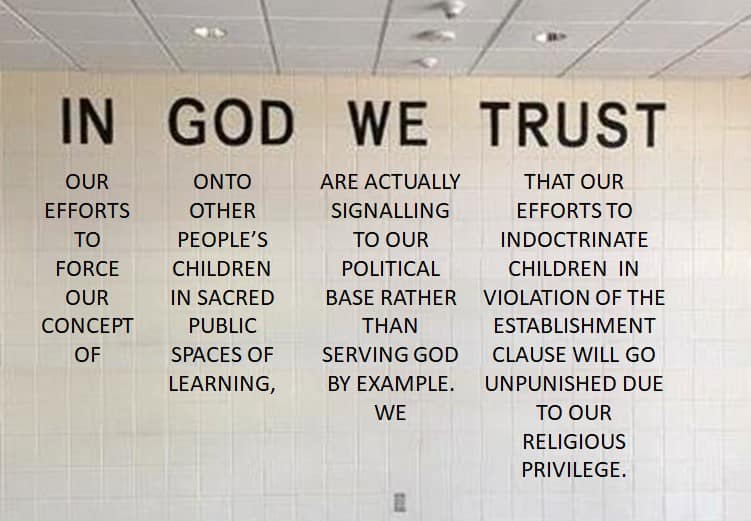What Did America’s Founding Fathers Intend?

In any case, there are areas in which there can be no doubt whatsoever, one of which is the establishment of religion and the separation of church and state. And the reason there can be no doubt is the clarity of the language used by people like John Adams, who said, “The government of the United States is not, in any sense, founded on the Christian religion.”
To that end, I thought I’d republish the meme above, sent by my colleague Paul Scott, co-founder of Plug-In America, and subject of one of the first interviews we did here on the “2GreenEnergy Report,” the video series that ran here in the first few years after the site was launched.

Craig,
The US Constitution contains the provision for a Supreme Constitutional Court to be the sole arbiter when interpreting the Constitution.
Once the Supreme Court rules on a constitutional issue, that judgment is virtually final.
Supreme Court decisions can be rescinded, altered or voided only by the rarely used procedure of a Constitutional Amendment, or by a new ruling of the Court.
The Second Amendment reads : “A well-regulated Militia, being necessary to the security of a free State, the right of the people to keep and bear Arms, shall not be infringed.”
The Supreme Court has consistently ruled on the wording as giving US citizens the right to possess weapons. The second amendment also grants both Federal, State Militias and even local. (what defines a “militia’ isn’t exactly clear).
Rightly or wrongly,the Second Amendment seems to have embedded in the American psyche the association of gun ownership with the basic tenets of freedoms afforded US citizens. The Second Amendment, in many ways, defines the character of the USA.
In most nations, the idea of an armed citizenry as a guarantee against Government or Foreign domination has long since disappeared as being impractical or even dangerous. No other nation has such a love affair with weapons. Even Americans who do not possess guns remain fascinated by the gun as a sort of sex symbol of power and social solution.
The capacity of modern civilians or even militia to defeat a modern military force, is absurd. Weaponry, with complex disciplined logistical supply is of little value in modern warfare. Nor, except in a fantasy, does any such threat exist within USA society.
The USA is in no danger of invasion by a foreign power, and despite the hysterical rhetoric of fantasists, is in no danger of civil war.
After the lesson of the devastating civil war, US civic institutions have proved resilient and flexible enough to allow Constitutional progress.
It would appear the only Constitutional way to remove the second amendment with any degree of authority is by Constitutional amendment.
Constitutional amendments are rare, but even bad ones can gain enough support (Volstead act).
The true test of restricting and perceived civil freedom accorded to US citizens, is by constitutional amendment. Of the four ways in which the Constitution can be changed, only one appears to be used.
Gaining the approval of two-thirds of both the House and Senate, and then being approved by 3/4 of the States, is the usual method . Perhaps an authorized national convention adopted by 3/4 of states, and ratified by 3/4 state legislatures would induce Congress and the President to pass such an Amendment, but such an occurrence is very unlikely.
The recent Quixotic quest by disgruntled members of Congress to reverse Citizens United, never looked to be anything more than a self-indulgent waste of time.
Of course there’s always a possibility a future Supreme Court may re-interpret the Second Amendment to accommodate the vast changes in weapon technology and society that have occurred over the past two hundred hundred years and decided private ownership of weaponry is no longer in the public interest.
Even so, many States may still retain or enact their own anti-gun control laws rendering gun control ineffective.
There just aren’t enough real votes to make legislators act, despite media outrage when massacres occur. The truth is US people don’t care enough about gun control, certainly not enough to overwhelm the well organized citizens who equate gun ownership with the preservation of liberty.